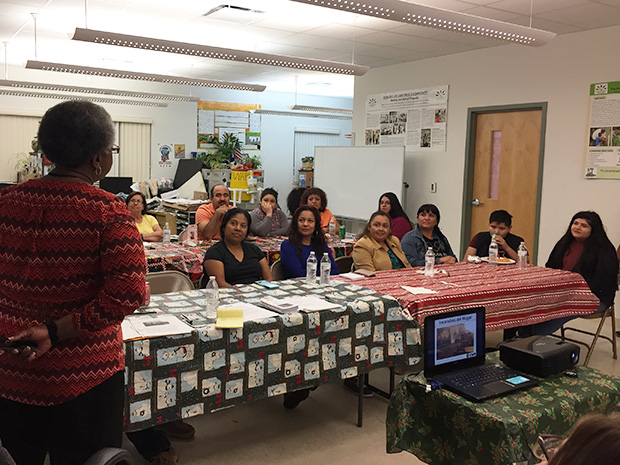The CWS U.S. domestic disaster response program focuses on preparedness, response and recovery among vulnerable groups within disaster-prone areas in Florida, Louisiana, Oklahoma, New Jersey, New York, North Carolina and Texas. Particular groups of focus include resettled refugees, vulnerable immigrants and undocumented populations impacted by domestic disaster. CWS Emergency Response Specialists are key points of contact for the CWS domestic disaster response program, including humanitarian needs following disasters in focal states, especially among refugee and immigrant communities. They foster partnerships for preparedness and recovery in focal states, coordinating CWS material resource shipments, as well as ongoing relationships with FEMA, VOADs, and other response agencies.
The CWS Domestic Disaster Program’s refocused efforts to work with immigrant and refugee populations chartered a course for us to work with populations that we have traditionally not been able to reach because of the hidden nature of these communities and the reluctance to trust – especially among undocumented populations – the service providers who respond to disasters.
It takes time to start working in communities where we haven’t been before, and I spent the last six months communicating with the Farmworker Association of Florida. Working with one of the founders of the organization and his staff, we decided how the program can form a relationship with these residents that would be beneficial to farm workers before, during and following a disaster.
The Farmworker Association has five different service offices in Central to South Florida, so we scheduled basic disaster preparedness trainings in each of them. Four of these trainings were held in the evening to accommodate the work schedule of the participants. In each setting, children accompanied their parents and also got first hand information on how to prepare themselves for disaster. We also visited a nursery to observe and enlighten us as to the working conditions of the migrant workers. This gave us a view of the working environment, which was helpful to us in planning the training to make sure it was as relevant as possible to the realities faced by participants.
The participants in each training spoke primarily Spanish. In Immokalee, the attendance was split between Mexican immigrants and Haitian immigrants. As we worked with both a Spanish and a Creole translator, we were reminded of the need to be aware of and sensitive to the differences and make-up of the communities we serve.
As we moved through each training, Susanne Gilmore and myself, both CWS Emergency Response Specialists, could feel the need and desire of these residents to be prepared. Participants, though, had limited knowledge of and resources to secure basic preparedness items such as smoke detectors, weather radios and contents of a ready to go kit in the event of evacuation or shelter in place (we provided each participant with the start of a kit by giving to them a CWS Hygiene Kit).
It also appeared that their isolation from the hub of information on disaster preparedness and training events meant that they had little formal knowledge of how to prepare for the various hazards that they were susceptible to. During the sessions, it was evident that they were enlightened by our presentation, but they also had another concerns about preparedness and safety issues in the work environment. They were seeking information from us that usually is provided from their employer, which highlighted the diverse needs of the community both around disaster preparedness and otherwise.
Because migrant worker communities are often hidden within larger communities, one of our goals is to utilize and work in partnership with their established networks. Our desire is to continue to provide this type of training to those communities and provide additional training later in response and recovery. Advocacy will be a key part of ensuring that these workers also become an established part of the disaster network in Florida.
We also had a training session at the CWS IRP+ Miami refugee resettlement office with people who had recently arrived from Cuba. They were a bit more aware of disaster preparedness and had experience from preparing and evacuating for hurricanes in Cuba. The training addressed the different preparedness tips in the U.S. that are totally unlike some of the tips and activities used in Cuba. That was certainly enlightening for us! It serves as a challenge to understand refugees’ previous experience in disaster outside of the US and translate that to what is like and unlike for them here in the US.
As we speak of preparedness, we need to be prepared to work within the different cultures we seek out. Gathering information and acquiring necessary materials and partnerships will help us get the message out clearer and understandable and provide us with the ability to translate our learning experience during these events to useful planning tools.
Our hosts were very kind and gracious to us in each setting. After spending eight days doing six trainings, we were glad to complete this cycle, but look forward to the next one.
Sandra Kennedy-Owes is a CWS Emergency Response Specialist.

